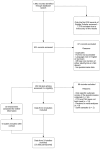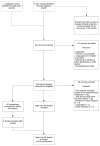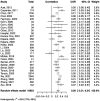Alexithymia as a mediator between adverse childhood events and the development of psychopathology: a meta-analysis
- PMID: 39011338
- PMCID: PMC11246998
- DOI: 10.3389/fpsyt.2024.1412229
Alexithymia as a mediator between adverse childhood events and the development of psychopathology: a meta-analysis
Abstract
Introduction: Victims of child abuse have an elevated risk of developing mental health issues later in life. Several variables have been suggested as mediators of this correlation, but little is known about the possible influence of alexithymia. Alexithymia is a sub-clinical personality trait that manifests as difficulties recognizing and verbalizing emotions.
Methods: In this study, two separate meta-analyses were conducted using questionnaire data, and Pearson correlations for overall effects were estimated.
Results: The correlation between child abuse and alexithymia showed to be significant (r = .26), as did the correlation between alexithymia and general psychopathology (r = .44). Further analyses revealed no indication for possible publication bias. When investigating differences between various subtypes of child maltreatment, each subtype significantly correlated with alexithymia. Emotional abuse, emotional neglect, and physical neglect had stronger correlations than physical and sexual abuse.
Discussion: These results suggest that alexithymia plays a mediating role, at least in part, in the relationship between experiences of child abuse and general psychopathology in adulthood. Therefore, alexithymia may be relevant to further research and deserves attention in the prevention of and therapy for mental health issues in victims of child abuse.
Keywords: BSI; CTQ; SCL-90; TAS-20; alexithymia; child abuse; psychopathology.
Copyright © 2024 Kick, Schleicher, Ecker, Kandsperger, Brunner and Jarvers.
Conflict of interest statement
The authors declare that the research was conducted in the absence of any commercial or financial relationships that could be construed as a potential conflict of interest.
Figures







References
-
- World Health Organization . World mental health report: transforming mental health for all. Geneva: World Health Organization; (2022). Available at: https://archive.hshsl.umaryland.edu/handle/10713/20295.
-
- Preece DA, Gross JJ. Conceptualizing alexithymia. Pers Individ Dif. (2023) 215:112375. doi: 10.1016/j.paid.2023.112375 - DOI
-
- Holder MD, Love AB, Timoney LR. The poor subjective well-being associated with alexithymia is mediated by romantic relationships. J Happiness Stud. (2015) 16:117–33. doi: 10.1007/s10902-014-9500-0 - DOI
Publication types
LinkOut - more resources
Full Text Sources
Research Materials
Miscellaneous

